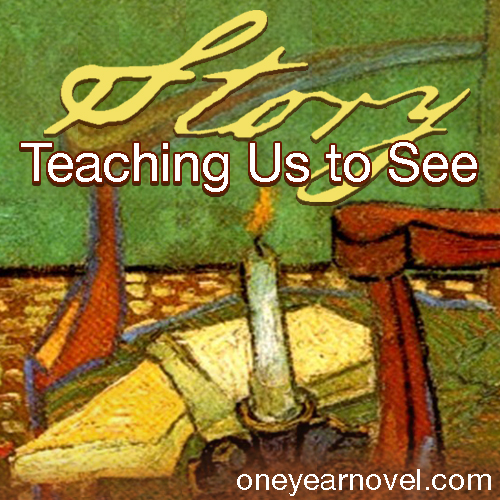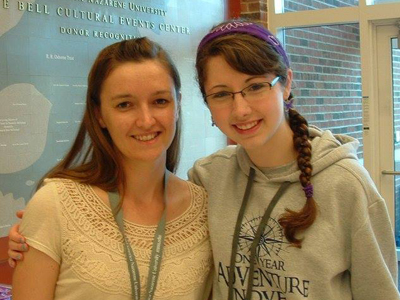Story: Teaching Us to See
Brynn Fitzsimmons, Guest Contributor
Why do stories matter? To those of us who are writers, that’s easy. Stories are our lives. Often it seems like the worlds in our minds are more interesting than reality.
But what about those who don’t talk to the voices in their head and may not have the slightest clue about the significance of the Black Pirate of Doom? Are stories still important?
Yes.
In a class on adolescent literature last semester, I read an excellent book, Reading Between the Lines: A Christian’s Guide to Literature, by Gene Veith, Jr. Veith used a pair of metaphors that struck me as perfect for describing exactly why literature matters to society in general: literature is a mirror, and a lamp.
The Mirror
Literature is a mirror. What do mirrors do? They reflect you as you really are. Likewise, stories are capable, like nothing else, of reflecting the fallen state of the world. Writers like Charles Dickens and Nathaniel Hawthorne are famous for using their stories as mirrors—portraying the darkness of their societies through memorable characters and compelling plots. Through stories, they could point out the flaws in even the most powerful leaders of their day without directly accusing them. After all, The Scarlet Letter was just a story, right?
The Scarlet Letter painted a stunningly accurate picture of the world in which Hawthorne lived—a world filled with hypocrisy and double standards. Hawthorne’s audience went about their daily lives in such a world, completely oblivious to its flaws. Hawthorne’s stories gave them a mirror so they could see what their world had become. He didn’t come out and say their culture was messed up. He set a story—a mirror—in front of them, and showed them that it was.
Human beings can be so good at hiding that they hide from themselves, which is why we need literature to show us who we are. For example, William Golding’s The Lord of the Flies tells a shocking tale of the levels of depravity to which a group of stranded boys sink while abandoned on an island. The most disturbing part of the book, however, is when you, the reader, realize that these boys are not so very different from yourself.
The book presents a disturbing truth: if we looked long and hard into the mirror, we would see a shocking depth of darkness lurking within. Story can do the long, hard looking for us, and reflect back to readers the common traits of humanity—the best and the worst.
Of course, if literature only reflected true reality, it would be just depressing most of the time. After all, when stripped of all its glittery trappings, the world is a bleak place. Thankfully, literature is also a lamp. That is, it also shows the world as it can be.
The Lamp
Literature sheds light on the world’s potential. Veith compares literature in this sense to a lamp, explaining, “Literature as a lamp projects what is in the mind into tangible forms.” What’s the purpose of a lamp? To light the way before you, right? Literature is the lamp that thrusts hazy hopes and dreams into concrete relief.
It’s the lamp that lights humanity’s way forward. Most people have a vague idea of a better tomorrow, a kinder world, a brighter future, but very few can articulate what that world actually looks like. Fewer still could describe how to achieve such a world. Stories, however, present both what and how with ease.
For example, the legends of King Arthur paint a picture of a world with chivalry, honor, justice, and higher purpose—all values our modern society severely lacks. The idea of living with honor, or chivalry, or any similar trait, is a vague concept at best, yet in literature it is crystal clear. The pleasure of the story lets the underlying ideas and values jump off the page and into the minds of readers everywhere, and from there, hopefully into their society as well. In this way, literature shines a lamp into a darkened world.
Just as literature reflects humanity at his worst, so it can also illuminate all that humanity could be, if only they would believe, or have courage—or whatever values the story happens to be presenting.
Fantasy in particular is famous for painting a picture of a better existence, because even if a fictional world exists only in the imagination, it can still provide insight into how things ought to be. This is where literature does what other forms of communication can’t: it makes a potential future tangible—it offers a path you can follow.
My favorite example of literature as a lamp is probably C.S. Lewis’ The Chronicles of Narnia. The children meet Aslan—a figure of Christ. As a kid, Aslan gave me a concrete picture of the otherwise vague concept of a personal relationship with an unseen God. That relationship, and what it should look like, became clearer to me. The children loved Aslan. They called to Him when they needed help. They were heartbroken to displease Him (remember Lucy, in The Voyage of the Dawn Treader, when she read the spell so that she might spy on her friends from school?). Far from a vague concept, their relationship with Aslan was very tangible and real, like a relationship with a person. And, at the end of The Voyage of the Dawn Treader, Aslan explains that the children must learn to know Him by His name in our world—not so hard a task after having known Him in Narnia.
If you’ve done the OYAN curriculum for very long, you remember Mr. S.’s question at the beginning of every lesson: “Why do we look for truth in books?” This is why. Literature is a lamp to light the path of humanity going forward. It doesn’t just tell us what to do. It shows us.
Scripture, truly the greatest Story ever told, actually refers to itself as both a mirror in James 2:23–24, and as a lamp in Prov. 3:5–6. More perfectly than anything we could hope to create, Scripture shows us who we are, and who we can become.
We can do the same with our stories. As human beings, created in the image of God, we “think God’s thoughts after Him,” as one of my professors is fond of saying. There are many ways to do that, but there’s something special about how literature goes about it. Think about it. Isn’t it funny that the one thing that tells us the truth about a fallen world, but tells also of the Truth that can save it, is a book? Is it an accident that of all the mediums God could have chosen to convey His mind to humanity, He chose a work of literature?
I guess there must be something special about stories.
…
Have you read any books that have been a mirror for you? What about a lamp?
…
About Brynn
Brynn is a senior Humanities Letters major/writing minor at Maranatha Baptist University in Watertown, Wisconsin. She is looking forward to where God will take her in writing after graduation, and someday she hopes to teach in a college classroom. She recently realized she needs to get another hobby besides writing, but has yet to find anything she loves as much. However, she does enjoy reading, playing the violin and the harp, and watching Lord of the Rings and Marvel films with her sisters.





When I was a kid, I read a lesser-known series by Lucy Maud Montgomery about a girl named Emily who wanted to be a writer. This series was both a mirror and a lamp to me at that time. It showed me who I was—showed me what it meant that I took such pleasure in words and in the beauty of nature. It also showed me what was in front of me. Considering that being a woman writer today is very different from being a woman writer at the turn of the century, I am still surprised by how practical and true the vision Montgomery cast in the Emily trilogy was. I still think of Emily sometimes, and of her perseverance, when I am frustrated.
This is amazing! I love how God just becomes bigger and bigger in our eyes as we recognize His character.
Recently, the Guardians series by William Joyce has been both a mirror and a lamp for me. In it, there’s a vision for a place where children can create and learn what they want to learn that reminds me of OYAN and one of my own dreams.